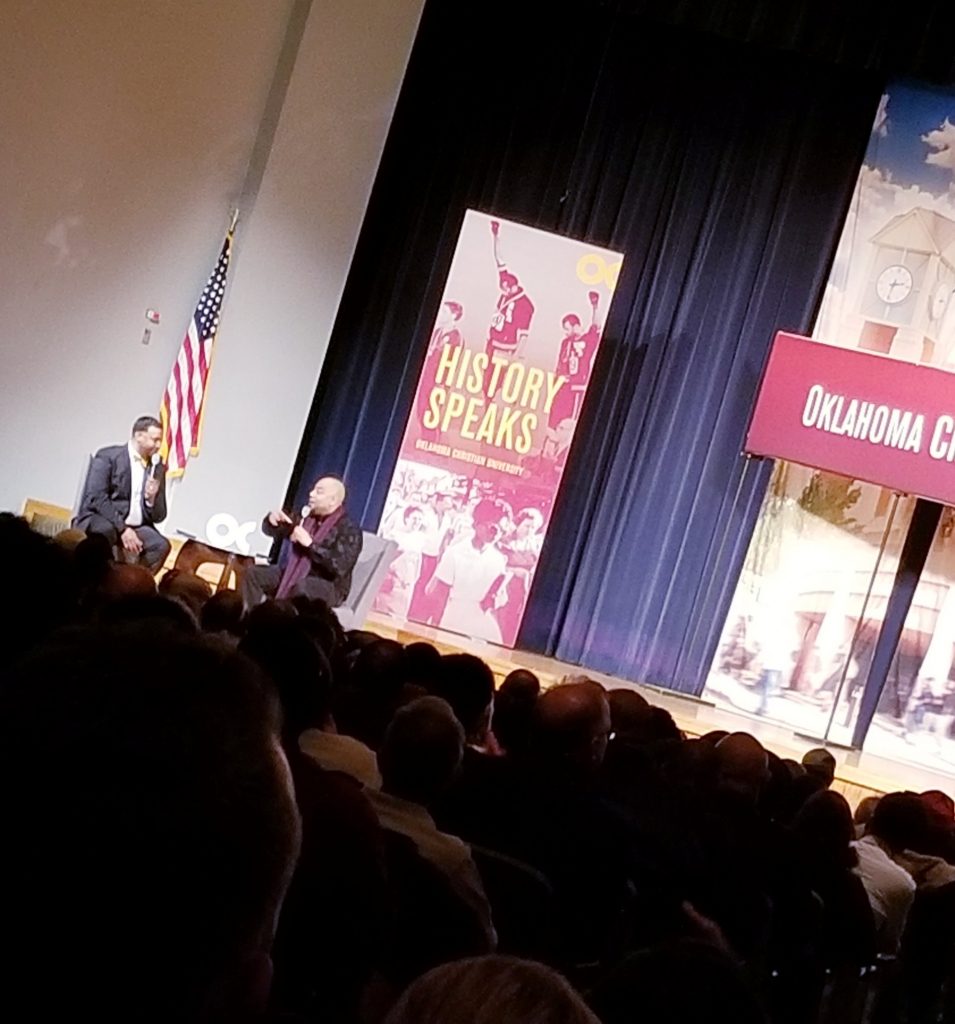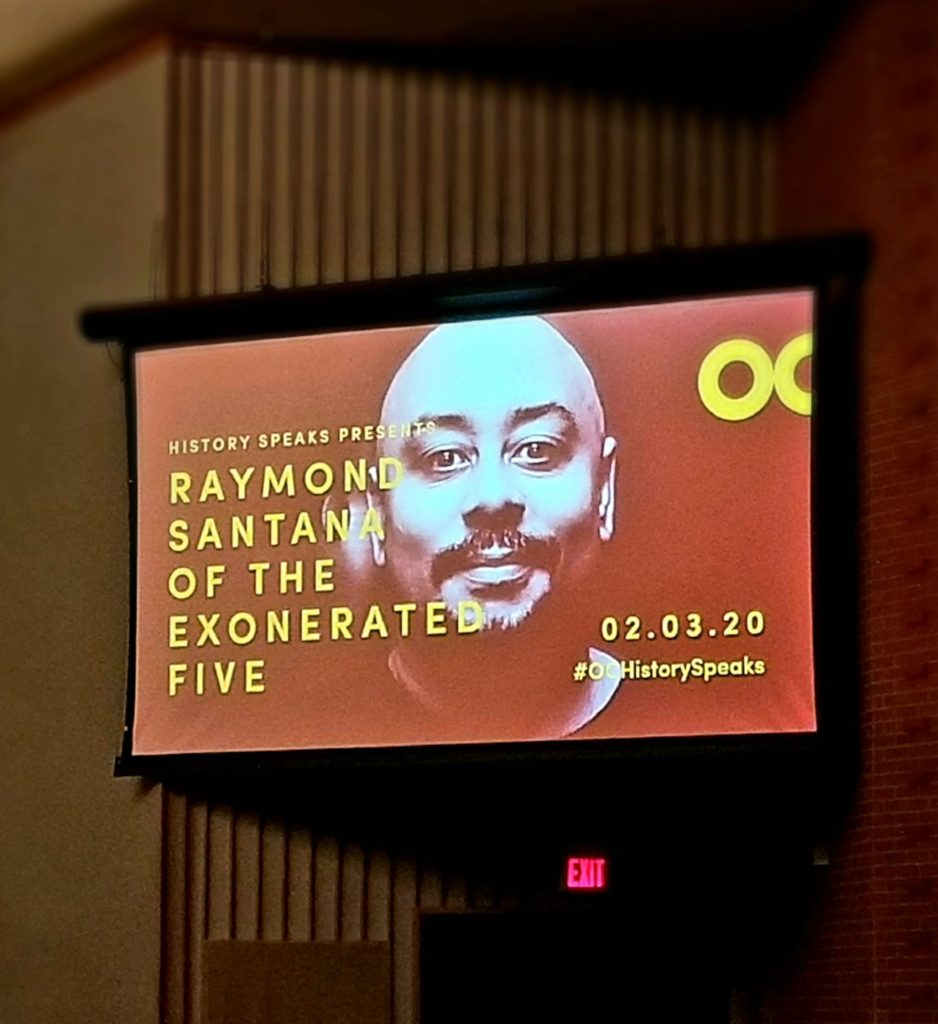Last Monday I was lucky enough to attend a fascinating speaking event with my sweet Mom. Edmond’s Oklahoma Christian hosted Raymond Santana as part of their 7th annual “History Speaks” speakers’ series, and it was time very well spent. You may know his name instantly from the Central Park Five saga, but before diving in I want to point out that much of the university’s literature and commentary touted him, instead, as one of the exonerated five, and I find that beautiful.
Mom and I sat in a sold out auditorium, knowing that several annex rooms had also been filled, where guests were watching the live conversation on big screens. Mom and I chatted with a few people seated near us and made notes of all the books being recommended (Just Mercy by Brian Stephenson among them).
When the University’s president introduced Gary Jones, their Dean of Students, the gentleman who organized the event, he invited us all to pray as a group, to agree that racism is a sin, for help seeking to understand more than to be understood, and for insight and courage to live well. They also played a video montage of previous years’ speakers, and I found myself wishing I could go back in time and listen to every single one. Certainly, we will pay attention in coming years and make a point to attend again.
Whether you have seen the Netflix series When They See Us and watched Oprah’s subsequent interviews with both the players and the actual people involved, or read about these events real time since the awful events in 1989, I think that you would find Mr. Santana’s remarks deeply valuable. He spoke life over his story and over his future. And he offered that same, powerful life to the audience. It was beautiful in every way, and when you consider the ugliness in his life, the injustice and suffering that happened to him at such a tender age, this beauty is a remarkable thing.

I could talk for hours about this 90 minute conversation. If you ever have a chance to hear Mr. Santana speak, jump on it. He is so overflowing with love, insight, and strength that you cannot possibly walk away feeling defeated in your own circumstances. Mr. Jones echoed my thought by commenting on how often we “complain about stuff that really isn’t that bad.”
Santana spoke of the 1989 events, of course, and did a good job describing the root of each misturn. Fear, mostly, is what came across to me. Natural fear and innocence and compliance, and the opportunistic tendency some people have to exploit all of that. He spoke of childlike hopelessness, and of bewilderment; but also he eventually spoke of the power of education in prison. Books were his arsenal for reframing his entire life. He named some of the formative titles and expressed with relatable affection how they helped him shape his thought process.
After being imprisoned for seven years, Santana was finally exonerated. But he made sure we understood that exoneration did not, and does not for others still, necessarily mean freedom. For someone ripped so traumatically from his childhood, he had an insightful grasp on the importance of finding safety in your home. He described the ongoing, residual pain from how deeply his character had been vilified.
“It is easier to build strong children than it is to repair broken men.” ~Frederick Douglass
Santana shared the back story of the genesis and production of When They See Us, and everyone especially loved his building Twitter banter with director Ava DuVernay. If like many you were unsettled by the documentary, he pressed us gently to remember that what they shared with the public was a watered down version of the truth. He also walked us through his feelings and thought process about how sharing any version of the truth would affect his friends (particularly Kory), how it would affect their futures. Because every story we tell does have an impact. It was a valuable reminder to me.
Okay. Let’s bask in some of the life he spoke over his story!
His faith was tested repeatedly. He had to learn how to be a fighter. But time has given him the perspective of not just being exonerated but of crafting his own freedom. He named blessing after blessing after blessing in his life and exuded spiritual energy as he spoke. “Back to back blessings,” is how he put it. It gave me goose bumps. Isn’t that how life is, really? Yes.
More on being a fighter, Santana described how it felt to be like a boxer, to always be waiting for the bell to ring, but also maybe not wanting it to ring. Over time he developed the skills and momentum that would eventually help him build The Innocence Project. He continued to find ways to “channel that fighting energy and get proper revenge by being successful.” When asked how it felt for the state of New York to never have apologized for the wrong done to him and the others, he just smiled and pointed to the fact that they have to see him on television all the time, watching him make something with his life. “God puts us on the platform. He gives us our voice back so we have to use it.”
This part grabbed my attention in a special way. In The Alchemist, we read that blessings ignored can become curses. If we are blessed with a voice, with a platform, then we are expected to use them. Ignoring such a blessing could become a dangerous curse.
Someone in the crowd asked for advice to a person on the brink of giving up. Santana had nothing rehearsed to say, nothing poetic, he just shrugged and shook his head almost like he was confused and said, matter of factly, “Never give up. Plain and simple.” He elaborated, gently, that giving up is just not an option. He suggested that we strive to envision our futures, seeing possibilities beyond our circumstances. I was deeply moved and reinvigorated for so many private battles in my own life.

Okay, friends. I could continue for a long time but will close up now. I am so thankful to my Mom for bringing me along to this beautiful evening. I am so humbled and inspired by everything Mr. Santana had to say. And I hope that some of this can transfer to your heart, to your life, for any battles you are fighting.
“Envision your future. See your possibilities.”
~Raymond Santana
XOXOXOXO
Beautiful
I love you!! Thank you for always reading babe.
Oh goodness! I’m so jealous! I had no idea he was here in OK to speak. “When They See Us” was so powerful and tragic to watch. I have often thought of the 5 men and what happened to them as children. As the mother of a son it broke my hurt. What an example of turning something tragic into something good. Thank you for sharing this incredible experience of hearing this inspiring person.
Sheila, yes! I have had some good conversations with my sister, who also has an adult son. It is an especially painful perspective, I think. Mr. Santana did such a good job inspiring construction from pain. You would have loved it.